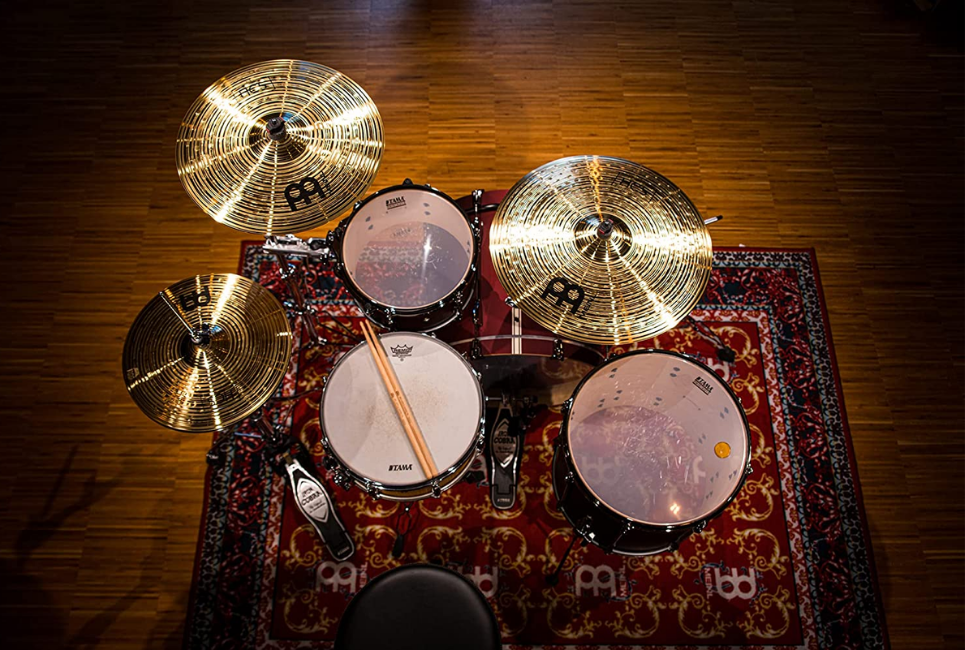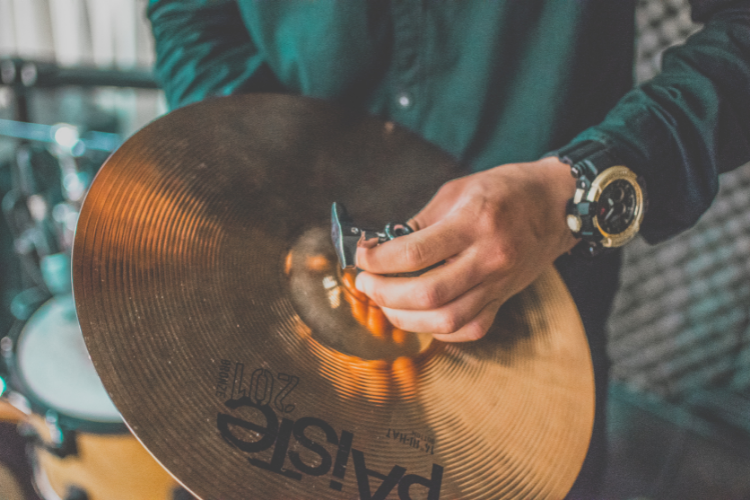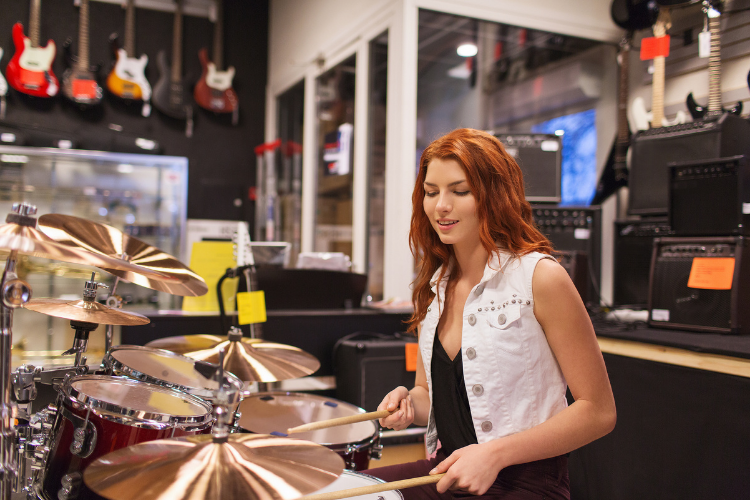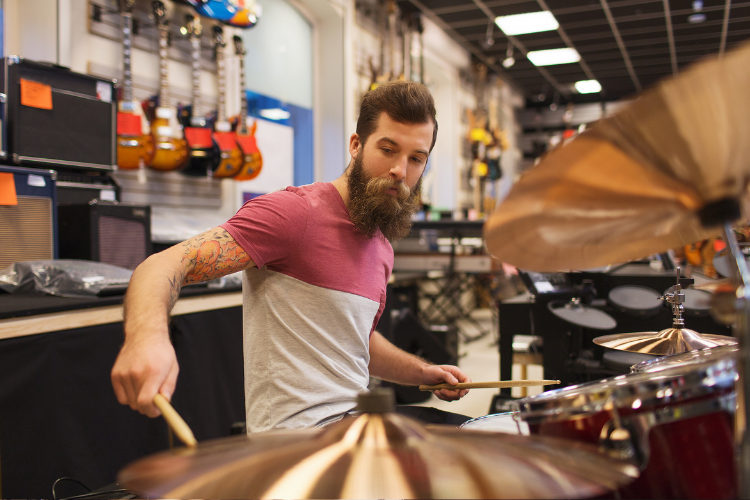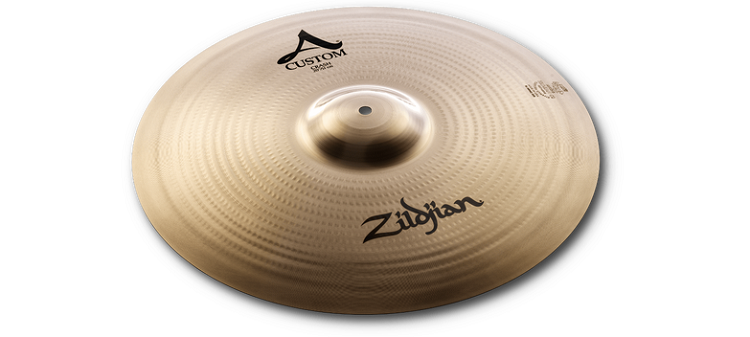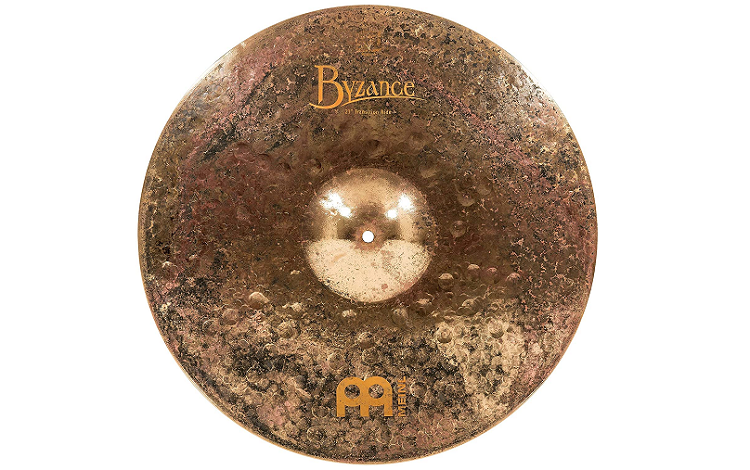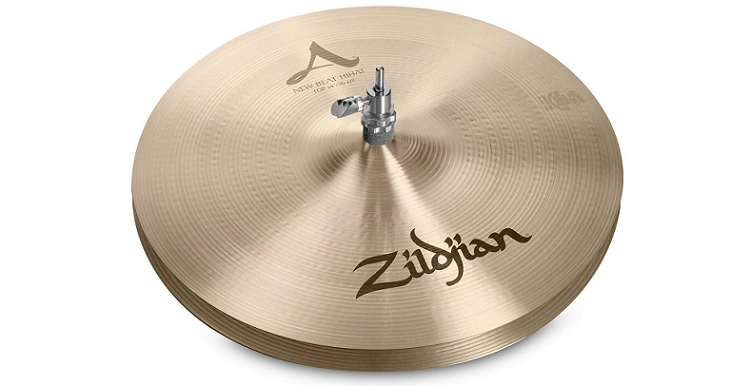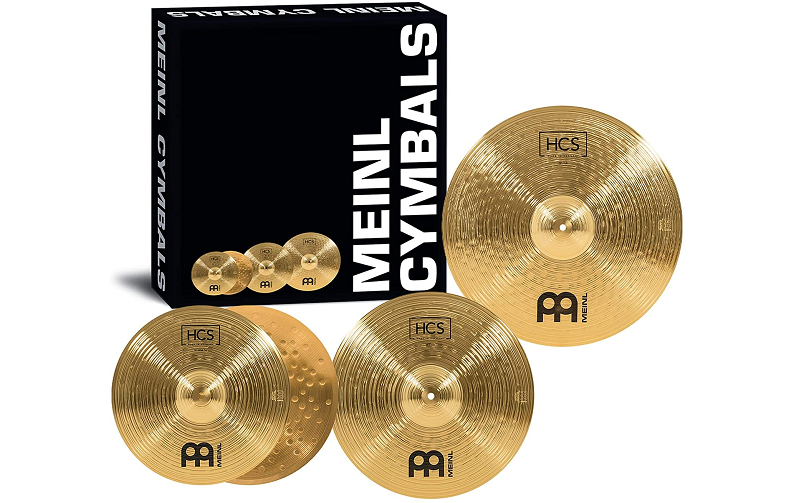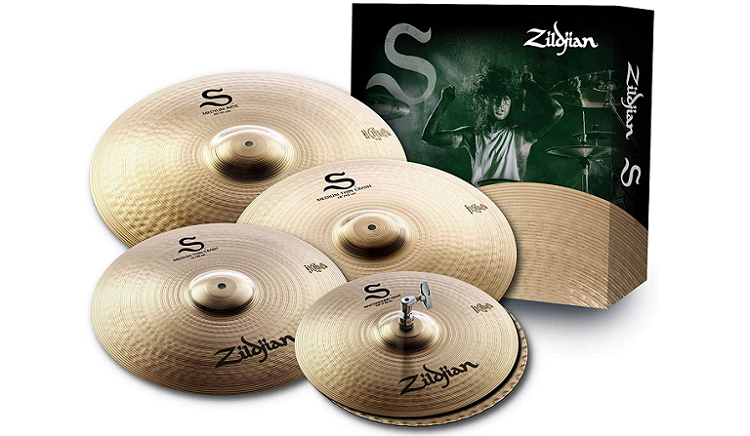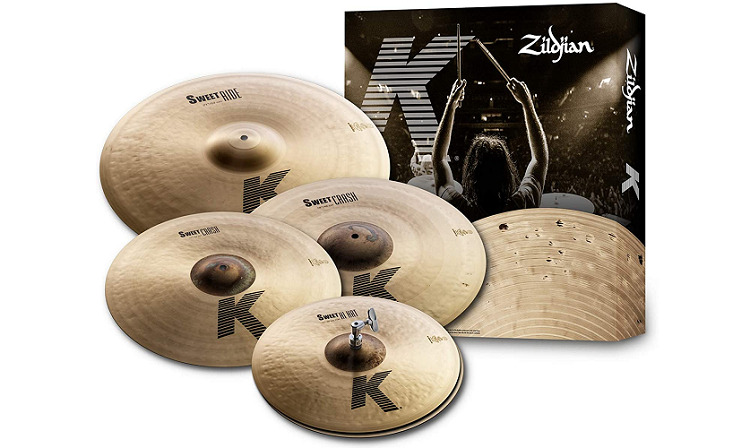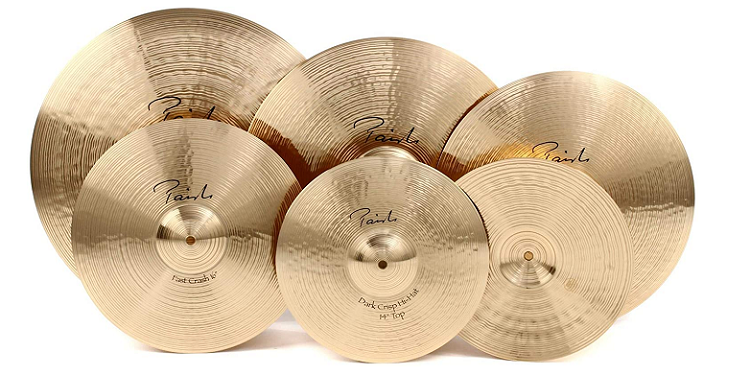One of the most important things I’ve come to learn over my two decades of drumming is that cymbal choice should take priority over drum choice. Drums can be altered in several ways to get better sounds, even the cheap ones. Cymbals don’t share this luxury. Cheap cymbals will always sound cheap, and expensive cymbals will always sound expensive.
When buying cymbals, you have the option of getting them individually or as a pack. If you’re wondering what the benefits of each choice are, you’ve come to the right place. I’m going to help you decide which option is better for you and your circumstances.
Bottom Line Upfront: Buying a cymbal pack is typically cheaper than buying cymbals individually. Most cymbal packs come with the essential cymbals needed for a drum kit setup including hi-hats, crashes, and a ride cymbal.
However, most cymbal packs have cymbals that share tonal qualities among them. If you want a truly individual mixture of sounds for your drum setup, buying individual cymbals would be a better way to go.
Main Differences Between Individual Cymbals vs Cymbal Packs
- Buying a cymbal pack saves money, whereas it’s typically more expensive to buy cymbals individually to form a cymbal setup
- Buying individual cymbals allows you to mix and match brands, whereas using a cymbal pack locks you to one brand
- You need to figure out what individual cymbals are good for varying purposes, whereas many cymbal packs are useful because they are designed for specific purposes
- Buying cymbals individually lets you choose which cymbals to get, whereas Cymbal packs come with standard cymbal configurations
- Buying a cymbal individually gives you more size options, whereas all the cymbals in a cymbal pack have standard sizes.
Individual Cymbals vs Cymbal Packs
There’s no better feeling than going to a music store and picking up a new cymbal. The texture a new cymbal adds to your drum setup is incredible to listen to. If you’re just looking for one cymbal, the clear option is to look for and buy one.
However, this article is about the decision to buy a cymbal pack or a group of cymbals that you’ve selected individually to compete with a pack. So, let’s look at individual cymbals through that light compared to buying a single cymbal pack that comes with everything you need.
Size
One of the biggest benefits I’ve found with buying cymbals individually is that you get more options when it comes to their size. Most cymbal packs have ride cymbals that are 20” – 22”. If you’re looking for something bigger, you can easily find a standalone ride cymbal to fit your needs. Some cymbal brands make rides that are 24” and upward.
The same can be said with every other type of cymbal. Most cymbal packs I know of come with 14-inch hi-hats. I’m a big hat guy, meaning I love playing hi-hats that are either 15” or 16”. I won’t be able to find those in a cymbal pack.
Cymbal packs typically come with standard cymbal sizes that look something like this:
- 14” hi-hats
- 16” crash
- 18” crash
- 20” – 22” ride
You can’t go wrong with this cymbal setup. So, if you aren’t looking for any sizes in particular, the standard cymbal setup from a pack will be perfect for most drummers. I’m not a big fan of crash cymbals that are 16”, though. Some packs come with one that is 19” or 20” instead. If you’re anything like me, that would be the better choice to go with.
Sound
When you choose to buy cymbals individually, you get to choose how your overall cymbal setup sounds. You could mix bright and dark cymbals to create a tonally complex environment. Buying cymbals individually is the only way to do this as cymbal packs typically share cymbals from the same series that the brand is offering, meaning they sound similar.
I’ve also found that having a unique set of cymbals is how you create your voice on the drum kit. If you buy a cymbal pack, your setup is going to sound the exact same as someone else’s setup that has the same cymbal pack.
When choosing cymbals individually, chances are high that no one will have the same cymbal setup as you. This means they won’t have the same drum kit sound as you either.
However, you could find the exact sound you’re looking for in a cymbal pack. For example, the Zildjian K Custom Dark pack is one of the most popular cymbal packs on the market thanks to the famous dark tones that you get.
If that’s the sound you want, there’s nothing wrong with sticking to it. It’s tried and tested! I encourage you to add a cymbal or two with that to add a bit of uniqueness, though.
Brand
There’s an argument to be had over whether using one brand around your drum set is better than using multiple. When buying cymbals separately, you get to mix and match cymbals from different brands. This broadens the number of options you have.
There are so many different lines of cymbals from popular cymbal brands that you have hundreds, if not thousands, of options to choose from.
I’m more of a single brand kind of guy, though. I love the aesthetic of having the same name on all my cymbals. However, I don’t think it’s what everyone should do. It limits you with sound options as all cymbal brands have excellent products on offer.
So, you should buy cymbals individually if you want to mix brands in your setup. No cymbal pack exists that has multiple cymbal brands in it.
If you’re more into looks than sounds, there’s no shame in that! I make a lot of drumming videos for Instagram and YouTube. Having the same brand on all my cymbals simply makes the videos look a lot cleaner, in my opinion.
I’d also suggest sticking with one brand if you plan on endorsing the brand one day. Companies love to see loyalty even before you associate with them. Getting a cymbal pack from a single brand would be ideal, in that case.
Price
Pricing is where individual cymbals fall short. It will always be cheaper to get a cymbal pack. Some individual cymbals cost even more than certain cymbal packs. If you want to buy a full set of cymbals by individually selecting each one, you can expect to pay over $2000 when choosing top-quality ones.
If you want to save as much money as you can, I highly suggest getting a cymbal pack. Budget packs cost as little as $500 for a full set of cymbals. Some intermediate ones cost just under $1000, and professional ones cost between $1000 and $2000.
Cymbal packs were designed with intention of customers saving a bit of money. You’ll often see a cymbal pack marketed as having one of the cymbals as a free addition.
If you’re not limited by budget, selecting a set of cymbals individually would arguably be a better move. However, that can be quite a tricky task if you’re not entirely clued up on what all the cymbals offer.
With that being said, let’s move on to the intention of certain cymbal packs and how they can be helpful to some buyers.
Purpose
Something that you can find with cymbal packs that you won’t find with individual cymbals is specific intention. What I mean by this is that you can find varying cymbal packs that are advertised for certain settings.
A good example of this is the Zildjian K Worship Pack. This pack includes different cymbals that work particularly well in church settings. Having an option like this makes it incredibly easy for churches to buy cymbals for their drum set as these are guaranteed to work well in the environment.
If a church wanted to buy cymbals individually, they’d need to research which options work best, taking extra time and potentially costing more money.
You can also find cymbal packs that work well in rock, metal, and jazz settings. If you’re a metal drummer who needs a new set of cymbals, it will be easier to buy a pack with one purchase that will perfectly suit the type of music that you’re playing.
Pros and Cons of Buying Individual Cymbals
Pros
- You get to create a more personalized cymbal setup
- There are more options to choose from
- You can mix brands to get unique sounds
- There are uniquely sized cymbals available
Cons
- More expensive to buy a whole set of cymbals individually than it is to buy a cymbal pack
Pros and Cons of Buying Cymbal Packs
Pros
- More affordable than buying a set of cymbals individually
- Some packs are designed for specific styles
- Cymbals in a pack are guaranteed to sound great when played together
- It’s easier to buy a cymbal pack than it is to search for cymbals individually
Cons
- Using a cymbal pack doesn’t give you a unique overall cymbal sound
- You may not find the cymbal sizes you want with a pack
Guide to Choosing Cymbals
Now that I’ve mentioned the benefits of each type of cymbal purchase, let’s move on to a quick guide on buying cymbals in general. You can apply the tips from this guide to either individual cymbals or cymbal packs. No matter which one you get, you should be looking for qualities along similar lines.
Budget
The first step in buying cymbals is to establish a budget. This will show you which cymbals you can potentially get, and which ones are too expensive. Thankfully, there are so many cymbal options out there that any budget you have will be sufficient to get a set. However, the higher your budget is, the better cymbals you’ll be able to buy.
The best way to get top-quality cymbals for a reasonable price is to buy them in a cymbal set. Cymbal sets will be a few hundred dollars cheaper than if you were to buy the same cymbals in that set individually.
I like to label cymbal options as entry-level, intermediate, and pro. Entry-level cymbals will be the cheapest option from each cymbal brand. You can buy one of them individually for less than $100 while an entry-level cymbal pack can cost between $100 and $200.
Intermediate cymbals will cost slightly more, and they’re typically heavy cymbals that work well in rock and metal settings.
Pro cymbals are your top option, and one of those will cost between $350 and $700 while a pro cymbal pack will cost from $1200 to $2000.
Sound Qualities
Your next step is to establish what sound qualities you’re looking for. It’s good to learn about what sound qualities cymbals will give you. Knowing these tonal properties will allow you to choose appropriate options for whatever music you play.
Here are a few tonal properties that you may find cymbals have:
- Dark (low-pitched)
- Bright (high-pitched and punchy)
- Dry (little sustain)
- Washy (lots of sustain)
The types of metal used to make the cymbals are largely what determine these properties. It’s also good to look at the size and weight as that will determine the tonal outcome as well.
If you’re unsure of what tonal qualities you want, think about the type of music that you play. If you’re playing drums in a rock or metal band, you’ll need some bright cymbals that have cutting sounds. If you’re playing drums in church, darker cymbals tend to work better.
Brand Options
Once you’ve established your budget and what types of cymbals you need, you should look at all your options from each cymbal brand. While there are dozens of good cymbal brands around, the four big ones are Meinl, Zildjian, Paiste, and Sabian.
Each one of these brands is guaranteed to have cymbals that you’re looking for. They all have varying lines of cymbals that shine through with all the possible tonal qualities that cymbals can give. They also all have decent entry-level sets that are perfect for beginner drummers.
As I said earlier, you can either stick with one brand or mix and match. If you get a cymbal pack, you’ll be sticking with a single brand.
Drum Kit Setup
The final thing worth thinking about before you buy cymbals is the exact setup that you’re aiming to have. The standard cymbal setup is what you’ll find with most packs. This includes a pair of hi-hats, two crash cymbals, and a ride cymbal. However, not every drummer loves playing with this exact setup.
For example, I often opt to use two ride cymbals when playing jazz gigs instead of having one or two crash cymbals. I’ll use a thinner ride as my crash, but I can play the bow of it as well for some beautiful texture. You won’t be finding any cymbal packs on the market that have two ride cymbals, so I’d need to buy cymbals individually if I didn’t already have them.
Individual Cymbal Options to Consider
Zildjian A Custom 18” Crash
The Zildjian 18” A Custom is one of the most iconic crash cymbals available. If I were to suggest any single crash to someone, it would be this. It has a place in every drum setup, no matter what genre of music you’re playing.
Its main quality is that it’s bright and punchy. However, I’ve found it to be one of the most musically expressive bright cymbals that I’ve played. I like to think of its sound as the classic cymbal sound that everyone hears in their head whenever they think of a cymbal.
While it’s not the cheapest crash cymbal around, it’s definitely not the most expensive either. It sits nicely in the middle, costing a decent amount but not breaking the bank.
I find myself opting for Zildjian K cymbals mostly if I have to choose Zildjian, but this is the one A Custom cymbal that has the stamp of approval from all the pro drummers that I know.
Pros
- Extremely popular crash cymbal
- Surprisingly versatile
- Bright and punchy
Cons
- May be too loud for intimate settings
Meinl Byzance 21” Transition Ride
The Meinl Byzance Transition Ride is one of the most versatile ride cymbals that I’ve had the pleasure of playing. Ride cymbals are often hit-and-miss, and this one appeals to a wider range of drummers than most.
It was designed with the help of Mike Johnston, who’s a world-famous drum educator. The whole idea behind it is that it can be crashed on quite hard, but it doesn’t lose any definition when you play the bow. The bell also sounds quite powerful.
It has an unlathed surface, meaning that you don’t get the shiny gold appearance that you may be used to with cymbals. Some drummers love this earthy look while others aren’t the biggest fans. Whichever camp you fall under, know that this ride is a top-quality option.
Pros
- Versatile
- Plenty of cymbal wash without the loss of stick articulation
- Beautiful dry tones
Cons
- Expensive
Zildjian 14” A New Beat Hi-Hats
The Zildjian 14” New Beats are similar to the A Custom crash in that they’re one of the most popular cymbal options to get. These hi-hats are some of the most recorded hi-hats in music history, being used by countless drummers for studio recordings.
They have a strong “chick” sound that pierces through any mix. They’re also incredibly articulate, allowing you to play complex patterns and have every note be heard.
The tone is overall quite bright. However, I find the open hi-hat sound to be fairly washy and more pleasant to hear than many other bright hi-hats.
I’d suggest steering clear of these if you love darker cymbals, though!
Pros
- Very popular hi-hat option
- Used in a large number of studio recordings
- Fantastic bright tone
Cons
- Not a good option for drummers who love dark cymbals
Cymbal Pack Options to Consider
Meinl HCS Basic Cymbal Set
If you’re a beginner drummer who needs a full set of cymbals, the Meinl HCS Basic set is a good option to start off with. I recommend this pack to all my students who bought drum kits that came with no-name brand cymbals.
While these aren’t the best cymbals, they’re perfectly usable for drummers who aren’t able to recognize tonal quality just yet. They feel great to play on!
The best thing about the Meinl HCS Series is the number of cymbal options you get. While this specific pack only comes with a few cymbals, you can also get chinas, splashes, and effects cymbals under the HCS line. No other cymbal brand has this many options in an entry-level line of products.
You’ll be saving a lot of money by buying this pack, and that can be used to buy a few extra individual cymbals to add to your setup!
Here’s what you get in this pack:
- 14” HCS hi-hats
- 14” HCS crash
- 18” HCS ride/crash
Pros
- Fantastic entry-level set of cymbals
- Very affordable
- You can easily add more unique HCS cymbals to your setup
Cons
- Sounds won’t be suitable for intermediate and pro drummers
Zildjian S Series Performer Set
The Zildjian S Series Performer Set is a worthy option if you want a step up from entry-level. Most cheap cymbals are made from a B8 alloy. These are made from a B12 alloy, boosting their quality a bit higher.
The main thing to know about them is that they’re quite thick. Because of this, I’d only say that they’re a good option for drummers that play heavy and energetic styles of music. You won’t find drummers using Zildjian S cymbals at a jazz gig.
Their tones are far superior to the tones from the Meinl HCS cymbals, so I’d suggest getting this pack if your budget is a bit higher.
Here’s what the pack includes:
- 14” S Mastersound hi-hats
- 16” S Medium Thin crash
- 18” S Medium Thin crash
- 20” S Medium ride
Pros
- Good intermediate cymbal pack
- Ideal for rock, metal, and punk
- Bright tones that cut through mixes with ease
Cons
- The cymbals lack a bit of tonal depth
Zildjian K Sweet Cymbal Set
The K Sweet set is my favorite cymbal set that Zildjian offers. The biggest reason for this is that all the cymbals are a bit oddly sized, but I also love how versatile their sweet tones are.
These cymbals feel buttery when you play them, and they’re more than worthy of most professional drummer’s setups.
While they work well for all styles, they tend to work incredibly well for jazz. I’ve seen some rock drummers using these. However, they’ve mixed a few brighter cymbals into their setup to make up for the lack of strong attack from these Sweet Ks.
Here’s what you get with the set:
- 15” K Sweet hi-hats
- 17” K Sweet Extra Thin crash
- 19” K Sweet Extra Thin crash
- 21” K Sweet Medium ride
Pros
- Beautiful tones
- Versatile
- The cymbals feel amazing to play
Cons
- Expensive
Paiste Signature Classic Cymbal Set
My last recommendation for a good cymbal pack is the Paiste Signature Classic cymbal set. If you have no budget limits but you still want to get a set, this is my top suggestion.
The Signature Classic cymbals are some of the best cymbals that Paiste offers. They have incredibly rich tones and they’re quite musically responsive.
You could use these cymbals in church, at a jazz gig, or in a recording studio. They’re some of the most expensive cymbals around, but they have a high price for a good reason. You also get five cymbals with this set, whereas most other cymbal packs only give you four.
Here’s what you get:
- 14” Signature Dark Crisp hi-hats
- 16” Signature Fast crash
- 18” Signature Full crash
- 20” Signature Full crash
- 22” Signature Full ride
Pros
- Professional cymbals
- Very rich tones
- Versatile
- You get 5 cymbals with one purchase
Cons
- Very expensive
FAQs
Answer: This largely depends on what level you’re at in your drumming journey. I wouldn’t suggest that any beginner spends more than $400 on cymbals. While you can get the best cymbal setup available for around $2000, a beginner wouldn’t notice the difference in tone between that and a $400 setup.
If you’ve been playing drums for many years, I’d suggest spending a bit more. It’s more important to have high-quality cymbals than it is to have high-quality drums. All the best cymbal packs cost between $1000 and $2000. So, anything in that price range would be a good choice for intermediate and professional drummers.
Answer: Most cheap cymbals are made from brass. Cymbal manufacturers use brass for their entry-level cymbals as it’s inexpensive to work with. The sound of brass cymbals is quite dull, which is why I wouldn’t recommend anyone who isn’t a beginner drummer use them.
Some of the higher-quality cheap cymbals are made from a B8 alloy. These cymbals have a lot more tone to them than brass cymbals do.
Answer: Meinl, Zildjian, Paiste, and Sabian are the leading cymbal brands in the world at the moment. In the drumming community, they’re referred to as the “Big 4”.
While they’re the most popular, there are other notable cymbal brands that make cymbals that easily compete. Some other names to mention are Istanbul Agop, Bosphorus, Anatolian, Wuhan, and Soultone.
Answer: The standard cymbal setup that most drummers opt for is having one set of hi-hats, two crash cymbals, and one ride cymbal. If you’re unsure of how many cymbals to have, that’s where you should start.
However, you’ll find yourself developing unique personal tastes as your drumming journey progresses. Once this happens, you may find yourself wanting more or fewer cymbals than that.
Conclusion
I once had an older and wiser drummer tell me that drummers should never buy cymbal packs. At the time, I believed him. However, I’ve come to realize how useful cymbal packs can be. They’re especially valuable to drummers who want to save money while getting a full set of cymbals.
If you can afford to, you should consider getting a full set of cymbals individually. If that’s not a possibility, then add a few individual cymbals onto the pack that you get to add a personal touch. I believe that developing your own voice on the kit is one of the most vital things you should do.
For more interesting reading on drum gear, check out the following articles:
